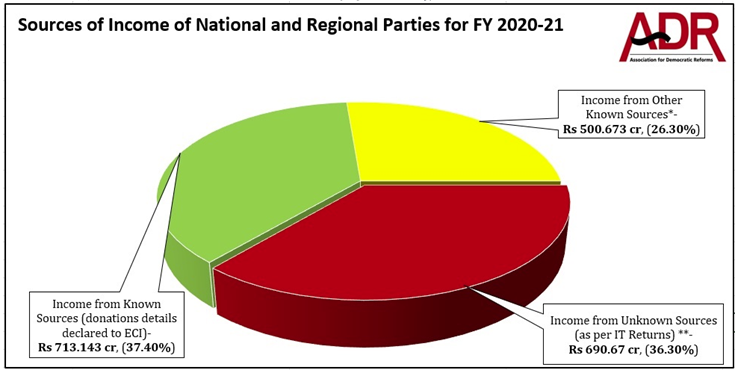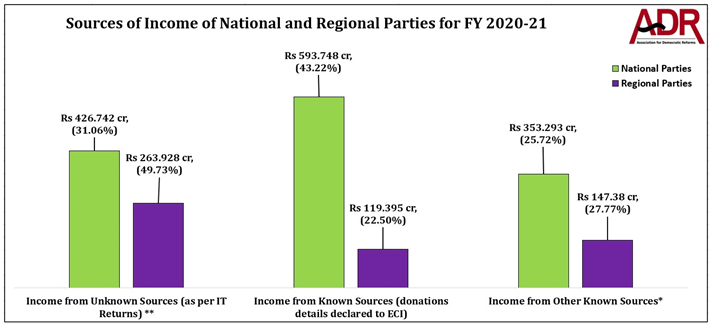Observations of ADR
- Between FY 2004-05 and 2020-21, the National Parties have collected Rs 15,077.97 cr from unknown sources (reports can be accessed here)
- For FY 2020-21, 8 National political parties have declared Rs 426.742 cr income from unknown sources and 27 Regional Parties received Rs 263.928 cr income from Unknown sources.
- During FY 2020-21, INC declared Rs 178.782 cr as income from unknown sources which is 41.89% of the total income of National Parties from unknown sources (Rs 426.742 cr).
- BJP declared Rs 100.502 cr as income from unknown sources which is 23.55 % of the total income of National Parties from unknown sources.
- Top 5 Regional parties’ unknown income: YSR-Congress – Rs 96.2507 cr, DMK – Rs 80.018 cr, BJD – Rs 67.0034 cr, MNS – Rs 5.773 cr and AAP – Rs 5.352 cr.
- Out of Rs 690.67 cr as income from unknown sources, share of income from Electoral Bonds was Rs 325.06 cr or 47.06%. (Electoral Bonds received by 8 National Parties (Rs 74.46 cr) and 27 Regional parties (Rs 250.60 cr).
- Combined income of INC and NCP from sale of coupons between FY 2004-05 and 2020-21 stands at Rs 4261.83 cr.
- There are reporting discrepancies in the audit and contribution reports of 7 political parties for FY 2020-21. These seven parties include AITC, CPI, AAP, SAD, KC-M, AIFB and AIUDF. In most cases, the share of donations above Rs 20, 000 declared by parties in their contribution reports does not match such income shown in their audit reports. This makes it difficult to arrive at an accurate figure of their income coming from unknown sources.
- Given below are the unknown sources of income declared by National and Regional parties for FY 2020-21:

- For this report, known sources have been defined as donations above Rs 20,000, whose donor details are available through contributions reports as submitted by National parties to the ECI.
- The unknown sources are income declared in the IT returns but without giving source of income for donations below Rs. 20,000. Such unknown sources include ‘donations via Electoral Bonds’, ‘sale of coupons’, ‘relief fund’, ‘miscellaneous income’, ‘voluntary contributions’, ‘contribution from meetings/morchas’ etc. The details of donors of such voluntary contributions are not available in the public domain.
- Other known sources of income include sale of moveable & immoveable assets, old newspapers, membership fees, delegate fee, bank interest, sale of publications and levy whose details would be available in the books of accounts maintained by political parties.
- Total income of 8 National political parties in FY 2020-21: Rs 1373.783 cr.
- Total income of 27 Regional political parties in FY 2020-21: Rs 530.703 cr.
- Total income of political parties from known donors (details of donors as available from contribution report submitted by parties to Election Commission and analysed by ADR – National & Regional parties): Rs 713.143 cr, which is 37.40 % of the total income of the parties.
- Total income of political parties from other known sources (e.g. sale of assets, membership fees, bank interest, sale of publications, party levy etc.): Rs 500.673 cr, or 26.30% of the total income.
- Total income of political parties from unknown sources (income specified in the IT Returns whose sources are unknown): Rs 690.67 cr, which is 36.30% of the total income of the parties.
- Out of Rs 690.67 cr as income from unknown sources, share of income from Electoral Bonds: Rs 325.06 cr or 47.06%.


- Out of total income of Rs 690.67 cr of 8 National and 27 Regional Parties from unknown sources, 47.06 % or Rs 325.06 cr came from Electoral Bonds.
- Income from sale of coupons declared by INC, NCP & CPM formed 39.72% (Rs 169.515 cr) of income from unknown sources while Donations from Voluntary Contributions (below Rs 20,000) formed 40.12% (Rs 171.1957 cr) in income from unknown sources of the 8 National Parties.
The Association for Democratic Reforms (ADR) was established in 1999 by a group of professors from the Indian Institute of Management (IIM) Ahmedabad.
To improve governance and strengthen democracy by working in the area of Electoral and Political Reforms, ADR for over 20 years has been gathering information, tabulating data and release reports pertaining to the political system of the country with emphasis on:
- Corruption and criminalization in the political process.
- Empowerment of the electorate through greater dissemination of information relating to the candidates and the parties, for a better and informed choice.
- Need for greater accountability of Political Parties.
- Need for inner-party democracy and transparency in party-functioning.
The opinions, beliefs and viewpoints expressed by authors, news service providers on this page do not necessarily reflect the opinions, beliefs and viewpoints of Hill Post. Any views or opinions are not intended to malign any religion, ethnic group, club, organization, company, or individual.
Hill Post makes no representations as to the accuracy or completeness of any information on this site page.



